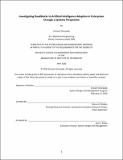| dc.contributor.author | Ghorpade, Avinash
(Avinash Gulabrao) | en_US |
| dc.contributor.other | Massachusetts Institute of Technology. Engineering and Management Program. | en_US |
| dc.contributor.other | System Design and Management Program. | en_US |
| dc.date.accessioned | 2021-10-08T16:48:38Z | |
| dc.date.available | 2021-10-08T16:48:38Z | |
| dc.date.copyright | 2020 | en_US |
| dc.date.issued | 2020 | en_US |
| dc.identifier.uri | https://hdl.handle.net/1721.1/132822 | |
| dc.description | Thesis: S.M. in Engineering and Management, Massachusetts Institute of Technology, System Design and Management Program, May, 2020 | en_US |
| dc.description | Cataloged from the official version of thesis. | en_US |
| dc.description | Includes bibliographical references (pages 102-118). | en_US |
| dc.description.abstract | Artificial Intelligence (AI) is a new digital technology and strategy imperative. It can have an enormous influence on the economy and society. In 1956, the term AI was introduced at the Dartmouth conference and used mainly in computer science research and academic domain. AI experienced several ups and downs since its inception. However, last the last few years, the availability of massive amounts of data, advanced algorithms, and an exponential increase in computing power is fueling its growth. It is acting as a key driver and value creator for industries such as healthcare, finance, education, manufacturing, and retail. Although a few enterprises are successful in adopting AI, others are struggling to identify potential AI use cases and realize investment returns. There are significant challenges enterprises need to overcome to adopt AI. This research aims to inform the successful enterprise adoption of AI by presenting a systems perspective and investigating the roadblocks. Based on the research work conducted, the six most dominant roadblocks for the successful adoption of AI are identified using literature survey approach and synthesizing learnings from AI-adoption failure cases. The identified roadblocks are: not recognizing the limits of current AI technologies, not recognizing the need for human judgment and involvement, lack of enterprise capabilities to manage risks associated with embracing AI, lack of strategy to market AI products and services, difficulty in moving from the AI-pilot stage to real-world applications stage, and not actively engaging all the stakeholders. Adopting holistic thinking is one approach to address the roadblocks faced in adopting AI at an enterprise level. | en_US |
| dc.description.statementofresponsibility | by Avinash Ghorpade. | en_US |
| dc.format.extent | 119 pages | en_US |
| dc.language.iso | eng | en_US |
| dc.publisher | Massachusetts Institute of Technology | en_US |
| dc.rights | MIT theses may be protected by copyright. Please reuse MIT thesis content according to the MIT Libraries Permissions Policy, which is available through the URL provided. | en_US |
| dc.rights.uri | http://dspace.mit.edu/handle/1721.1/7582 | en_US |
| dc.subject | Engineering and Management Program. | en_US |
| dc.subject | System Design and Management Program. | en_US |
| dc.title | Investigating roadblocks to artificial intelligence adoption in enterprises through a systems perspective | en_US |
| dc.type | Thesis | en_US |
| dc.description.degree | S.M. in Engineering and Management | en_US |
| dc.contributor.department | Massachusetts Institute of Technology. Engineering and Management Program | en_US |
| dc.identifier.oclc | 1262990963 | en_US |
| dc.description.collection | S.M.inEngineeringandManagement Massachusetts Institute of Technology, System Design and Management Program | en_US |
| dspace.imported | 2021-10-08T16:48:37Z | en_US |
| mit.thesis.degree | Master | en_US |
| mit.thesis.department | SysDes | en_US |
